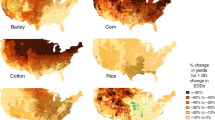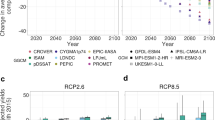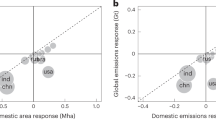Abstract
Projecting the impacts of climate change on agriculture requires knowing or assuming how farmers will adapt. However, empirical estimates of the effectiveness of this private adaptation are scarce and the sensitivity of impact assessments to adaptation assumptions is not well understood1,2. Here we assess the potential effectiveness of private farmer adaptation in Europe by jointly estimating both short-run and long-run response functions using time-series and cross-sectional variation in subnational yield and profit data. The difference between the impacts of climate change projected using the short-run (limited adaptation) and long-run (substantial adaptation) response curves can be interpreted as the private adaptation potential. We find high adaptation potential for maize to future warming but large negative effects and only limited adaptation potential for wheat and barley. Overall, agricultural profits could increase slightly under climate change if farmers adapt but could decrease in many areas if there is no adaptation. Decomposing the variance in 2040 projected yields and farm profits using an ensemble of 13 climate model runs, we find that the rate at which farmers will adapt to rising temperatures is an important source of uncertainty.
This is a preview of subscription content, access via your institution
Access options
Subscribe to this journal
Receive 12 print issues and online access
$209.00 per year
only $17.42 per issue
Buy this article
- Purchase on Springer Link
- Instant access to full article PDF
Prices may be subject to local taxes which are calculated during checkout



Similar content being viewed by others
References
Schneider, S. H., Easterling, W. E. & Mearns, L. O. Adaptation: Sensitivity to natural variability, agent assumptions and dynamic climate changes. Clim. Change 45, 203–221 (2000).
White, J. W., Hoogenboom, G., Kimball, B. A. & Wall, G. W. Methodologies for simulating impacts of climate change on crop production. F. Crop. Res. 124, 357–368 (2011).
Menzel, A., Von Vopelius, J., Estrella, N., Schleip, C. & Dose, V. Farmers’ annual activities are not tracking the speed of climate change. Clim. Res. 32, 201–207 (2006).
Mendelsohn, R., Nordhaus, W. D. & Shaw, D. The impact of global warming on agriculture: A ricardian analysis. Am. Econ. Rev. 84, 753–771 (1994).
Schlenker, W. & Roberts, D. L. Nonlinear temperature effects indicate severe damages to US corn yields under climate change. Proc. Natl Acad. Sci. USA 106, 15594–15598 (2009).
Kelly, D., Kolstad, C. & Mitchell, G. Adjustment costs from environmental change. J. Environ. Econ. Manage. 50, 468–495 (2005).
Johns, T. C. et al. Climate change under aggressive mitigation: The ensembles multi-model experiment. Clim. Dynam. 37, 1975–2003 (2011).
Reidsma, P., Ewert, F. & Lansink, A. O. Analysis of Farm Performance in Europe under different climatic and management conditions to improve understanding of adaptive capacity conditions. Climatic Change 84, 403–422 (2007).
Hawkins, E. et al. Increasing influence of heat stress on French maize yields from the 1960s to the 2030s. Glob. Change Biol. 19, 937–947 (2013).
Supit, I. et al. Assessing climate change effects on European crop yields using the crop growth monitoring system and a weather generator. Agric. For. Meteorol. 164, 96–111 (2012).
Peltonen-Sainio, P. et al. Coincidence of variation in yield and climate in Europe. Agric. Ecosyst. Environ. 139, 483–489 (2010).
Olesen, J. E. et al. Impacts and adaptation of European crop production systems to climate change. Eur. J. Agron. 34, 96–112 (2011).
Supit, I. et al. Recent changes in the climatic yield potential of various crops in Europe. Agric. Syst. 103, 683–694 (2010).
Ewert, F., Rounsevell, M. D. a., Reginster, I., Metzger, M. J. & Leemans, R. Future scenarios of European agricultural land use I. Estimating changes in crop productivity. Agric. Ecosyst. Environ. 107, 101–116 (2005).
Lin, M. & Huybers, P. Reckoning wheat yield trends. Environ. Res. Lett. 7, 024016 (2012).
Brisson, N. et al. Why are wheat yields stagnating in Europe? A comprehensive data analysis for France. F. Crop. Res. 119, 201–212 (2010).
Lobell, D. B., Schlenker, W. & Costa-Roberts, J. Climate trends and global crop production since 1980. Science 333, 616–620 (2011).
Long, S. P., Ainsworth, E. A., Leakey, A. D. B. & Morgan, P. B. Global food insecurity. Treatment of major food crops with elevated carbon dioxide or ozone under large-scale fully open-air conditions suggests recent models may have overestimated future yields. Phil. Trans. R. Soc. B 360, 2011–2020 (2005).
Long, S. P., Ainsworth, E. A., Leakey, A. D. B., Nosberger, J. & Ort, D. R. Food for thought: Lower-than-expected crop yield stimulation with rising CO2 concentrations. Science 312, 1918–1921 (2006).
Lobell, D. B., Banziger, M., Magorokosho, C. & Vivek, B. Nonlinear heat effects on African Maize as evidenced by historical yield trials. Nature Clim. Change 1, 42–45 (2011).
Hatfield, J. L. et al. Climate impacts on agriculture: Implications for crop production. Agron. J. 103, 351–370 (2011).
Lobell, D. B. et al. The critical role of extreme heat for maize production in the United States. Nature Clim. Change 3, 497–501 (2013).
Asseng, S. et al. Uncertainty in simulating wheat yields under climate change. Nature Clim. Change 3, 827–832 (2013).
Osborne, T., Rose, G. & Wheeler, T. Variation in the global-scale impacts of climate change on crop productivity due to climate model uncertainty and adaptation. Agric. For. Meteorol. 170, 183–194 (2012).
Rosenzweig, C. & Parry, M. Potential impact of climate change on world food supply. Nature 367, 133–138 (1994).
EU, Farm Accountancy Data Network (European Commission, 2013) ec.europa.eu/agriculture/rica/index.cfm
Sacks, W. J., Deryng, D., Foley, J. A. & Ramankutty, N. Crop planting dates: An analysis of global patterns. Glob. Ecol. Biogeogr. 19, 607–620 (2010).
Matsuura, K. & Willmott, C. J. Terrestrial Precipitation: 1900–2008 Gridded Monthly Time Series Version 2.01 (University of Delaware, 2009) http://climate.geog.udel.edu/climate/
Matsuura, K. & Willmott, Terrestrial Temperature: 1900–2008 Gridded Monthly Time Series Version 2.01 (University of Delaware, 2009) http://climate.geog.udel.edu/~climate/
Hawkins, E. & Sutton, R. The potential to narrow uncertainty in regional climate predictions. Bull. Am. Meteorol. Soc. 90, 1095–1107 (2009).
Acknowledgements
We would like to thank M. Burke for comments on the manuscript and the Stanford Interdisciplinary Graduate Fellowship for financial support for this project.
Author information
Authors and Affiliations
Contributions
F.C.M. and D.B.L. designed the analysis. F.C.M. performed the analysis. F.C.M. and D.B.L. analysed results and wrote the paper.
Corresponding author
Ethics declarations
Competing interests
The authors declare no competing financial interests.
Supplementary information
Rights and permissions
About this article
Cite this article
Moore, F., Lobell, D. Adaptation potential of European agriculture in response to climate change. Nature Clim Change 4, 610–614 (2014). https://doi.org/10.1038/nclimate2228
Received:
Accepted:
Published:
Issue Date:
DOI: https://doi.org/10.1038/nclimate2228
This article is cited by
-
The impact of climate change on wheat in Turkey
Regional Environmental Change (2024)
-
An analysis of the barriers to using climate information services to build a resilient agricultural system in Iran
Natural Hazards (2024)
-
Climate Changes Affect Human Capital
Economics of Disasters and Climate Change (2024)
-
Agricultural Vulnerability to Drought in China’s Agro-pastoral Ecotone: A Case Study of Yulin City, Shaanxi Province
Chinese Geographical Science (2023)
-
Exploring potential impacts of climatic variability on production of maize in Pakistan using ARDL approach
Acta Geophysica (2023)



